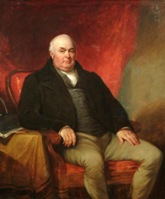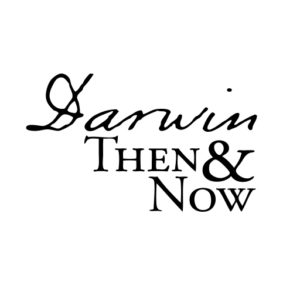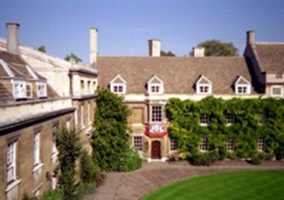
Leaving studies in medicine at the University of Edinburgh after the first year and fearing that his son would “ne’er do well,” his father [Robert Darwin], a practicing physician, enrolled Charles at Christ’s College (pictured left), University of Cambridge, in 1827.
His father reasoned that a Bachelor of Arts degree in theology would qualify Darwin to become financially independent as a Church of England clergyman—a guaranteed government professional with a comfortable income.
Clergy training in the Church of England during the Victorian era included developing the skills of a naturalist. Gaining insights into the wonders of creation was essential to appreciate and understand His greatness, creativity, and power.
Free-Thinking Legacy
Regularly attending a Unitarian church with his mother, sisters, and brothers, the Darwins were a free-thinking family rather than traditional Church of England members. His father [pictured right] only attended on rare occasions.
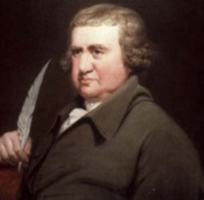 Unlike Christ’s College, the curriculum at Edinburgh, nicknamed the “Athens of the North,” incorporated evolution. Both his father and grandfather [Erasmus Darwin – pictured left] studied medicine at Edinburgh University.
Unlike Christ’s College, the curriculum at Edinburgh, nicknamed the “Athens of the North,” incorporated evolution. Both his father and grandfather [Erasmus Darwin – pictured left] studied medicine at Edinburgh University.
His grandfather, Erasmus, a critical thinker during the Midlands Enlightenment era, advocated for evolution in his widely read book, Zoonomia, or the Laws of Organic Life [pictured right]. The prospect, then, of becoming a clergyman in the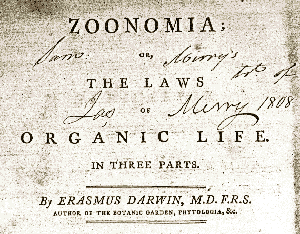 The Church of England challenged Darwin’s free-thinking ways.
The Church of England challenged Darwin’s free-thinking ways.
Since enrollment at Christ’s College required acceptance of the Thirty-nine Articles of the Church of England, the thought of attending Christ’s College required a measure of reflection. Darwin wrote in his Autobiography –
“I asked for some time to consider, as from what little I had heard or thought on the subject, I had scruples about declaring my belief in all the dogmas of the Church of England; though otherwise, I liked the thought of being a country clergyman.”
On finally signing acceptance of the articles to enter Christ’s College in 1828 at the age of nineteen, Darwin recalls:
“I did not then in the least doubt the strict and literal truth of every word in the Bible; I soon persuaded myself that our Creed must be fully accepted.”
Day-Dream Delights
At Christ’s College, Charles Darwin [pictured right] found the Bible inspiring. In the characteristic free-spirit legacy, Darwin recalls –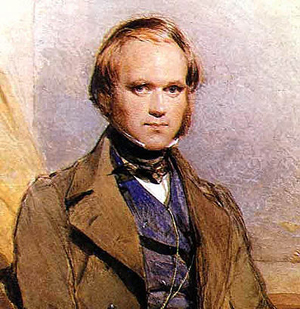
“Inventing day-dreams of old letters between distinguished Romans and manuscripts being discovered at Pompeii or elsewhere, which confirmed in the most striking manner of all that was written in the Gospels.”
Theology, however, was upstaged by the call of nature –
“No pursuit at Cambridge was followed with nearly so much eagerness or gave me so much pleasure as collecting beetles.”
At Cambridge, Darwin’s interest in Euclid’s mathematics and geometry equaled his interest in William Paley’s book entitled the Evidences of Christianity. Darwin aligned with Paley’s classic design perspective. As Darwin explains –
“I am convinced that I could have written out the whole of the Evidences with perfect correctness… The logic of this book, as I may add of his Natural Theology, gave me as much delight as did Euclid.”
“Most Joyful”
Life at Christ’s College was good; his room is pictured right. As Darwin later noted in his Autobiography –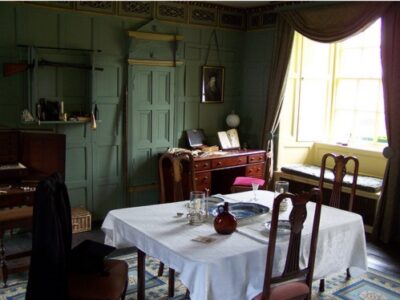
“Upon the whole, the three years which I spent at Cambridge were the most joyful in my happy life, for I was then in excellent health and almost always in high spirits.”
“Damnable Doctrine”
The process of developing a new explanation for life was costly; the joy slowly eroded. Darwin explains –
“Thus disbelief crept over me at a very slow rate, but was at last complete…. I can indeed hardly see how anyone ought to wish Christianity to be true… this is a damnable doctrine.”
Ideas drive consequences –
“I will here give the vague conclusions to which I have been driven. The old argument of design in nature, as given by Paley, which formerly seemed to me so conclusive, fails now that the law of natural selection has been discovered.… There seems to be no more design in the variability of organic beings and in the action of natural selection than in the course which the wind blows. Everything in nature is the result of fixed laws.”
Darwin later reflected –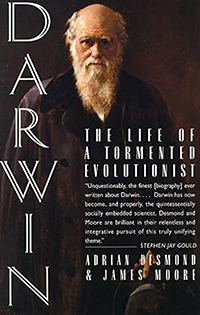
“I did not think much about the existence of a personal God until a considerably later period of my life.”
Written by Adrian Desmond, an Honorary Research Fellow in the Biology Department at University College London, and James R Moore, the title of their book “Darwin: The Life of a Tormented Evolutionist” [pictured right] details the price Darwin paid for his dilemma. The theory of evolution never ends with a silver lining – “survival of the fittest” is brutal.
Genesis
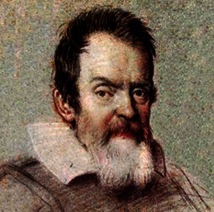 The Genesis account written by Moses is an introduction to biblical accounts. Written over more than 1,500 years, twenty-six of the Bible’s sixty-six books directly reference the Genesis account – a biblical cornerstone.
The Genesis account written by Moses is an introduction to biblical accounts. Written over more than 1,500 years, twenty-six of the Bible’s sixty-six books directly reference the Genesis account – a biblical cornerstone.
An Italian astronomer, physicist, engineer, philosopher, and mathematician who played a significant role in the scientific revolution during the Renaissance, Galileo Galilei [pictured left], is known as the “father of observational astronomy” and the “father of modern physics” declares during the Scientific Revolution –
“God is known by nature in his works, and by doctrine in his revealed word.”
Charles Darwin’s biography underscores why his theory of evolution remains speculative but not scientifically valid.
Christ’s College to “Damnable Doctrine” is a Biographical Sketch of Charles Darwin article.
Darwin Then and Now is an educational resource on the intersection of evolution and science and the challenges facing the theory of evolution.
Move On
Explore how to understand twenty-first-century concepts of evolution further using the following links –
-
- The Understanding Evolution category showcases how varying historical study approaches to evolution have led to varying conclusions. Subcategories include –
- Studying Evolution explains how key evolution terms and concepts have changed since the 1958 publication of The Origin of Species.
- What is Science explains Charles Darwin’s approach to science and how modern science approaches can be applied for different investigative purposes.
- Evolution and Science feature study articles on how scientific evidence influences the current understanding of evolution.
- Theory and Consensus feature articles on the historical timelines of the theory and Natural Selection.
- The Biography of Charles Darwin category showcases relevant aspects of his life.
- The Glossary defines terms used in studying the theory of biological evolution.
- The Understanding Evolution category showcases how varying historical study approaches to evolution have led to varying conclusions. Subcategories include –

